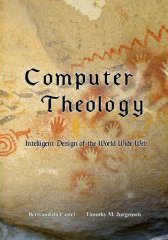PRESS
COMPUTER THEOLOGY |
||||
|
stimulate
that action or not. Thus, trust is the essential ingredient in the occurrence
of interactions in general and is noteworthy in its governance impact on
interactions involving people. Specifically, a person must achieve the
necessary level of trust in anticipating the outcome of a transaction, or in
some contributing factor to a transaction, or else they will choose not to
participate in the transaction, or to participate in some different manner or
degree. When the mind seeks to stimulate an action, if the level of trust is
sufficient then the stimulus is effected, otherwise the stimulus is withheld. This,
of course, presupposes that one has a choice relative to participation. Absent
such discretion, if an interaction is forced, then people may still try to
affect the outcome based on their level of trust in any optional means or
characteristic of the interaction at their disposal. It is interesting to note
a mental condition known as abulia
that is symptomatic of the loss of mental capacity to effect independent
action. This observation is not intended to draw a direct correlation between
the concept of trust that we have suggested and this specific mental condition.
Rather, we view the condition simply as indicative of the existence of a
governing process for the stimulation of responses. Trust can be
discerned in the interactions with inanimate objects as well as those that
include humans or various other organic participants. If we drop a brick, our
expectation is that it will fall to the floor; an expectation or trust based on
our understanding of the motion of free moving bricks as derived from our previous
experience. If we have previously dropped a bucket, but not a brick, our
facilities for metaphorical understanding will attempt to apply the correct
context to the action of the brick. If we drop a brick directly over our foot,
our essentially instinctive assessment that it is going to land on the foot may
well be sufficient to trigger a near-reflex action, causing us to quickly move
our foot. More generally, our facilities for metaphorical understanding
encompass the establishment of trust based on experience. The first time we see
someone release a helium filled balloon, we might actually exhibit surprise
when the balloon goes up and not down. Should a tree appear near to falling in
the forest, with no one around, there might still be a high degree of trust in
our expectation that the tree will fall to the ground. Consequently, we might
well choose to not park our automobile beside a dead and leaning tree which is
next to the campground parking lot. From a quantitative perspective, trust can be construed as a probability and in some instances can be rigidly specified. A concept with similar characteristics to trust is that of a scattering cross-section; that is, the probability of an interaction comprised of one elementary particle bouncing off of another elementary particle in a very specific fashion within a particle accelerator. The unit probability of a cross-section is called a barn. The unit derives from early studies on rather simple, high probability interactions. In one such interaction as an example, the probability that a 1/2 MeV electron will interact with a gold atom located in a stationary gold foil is so high that it’s like “hitting the side of a barn with a baseball.” (You really have to love the sense of humor of those atomic physicists.) The point is that in well-defined interaction environments, a level of trust can sometimes be quantitatively prescribed. Outside the laboratory, when we consciously talk about trust, we don’t typically ascribe such a quantitative assessment. We usually refer to it in very general terms: “I trust him,” “I don’t trust her,” “I trust the mortgage company to pay my property taxes on time.” All of these statements reflect a cognitively expressed evaluation of a level of trust, but the meaningful expression of trust is the one that results in action or inaction. If I jump out of the plane, I have made a profound evaluation that I trust the parachute to get me safely to the ground. This evaluation is highly dependent on the circumstances surrounding the immediate interaction, including any pertinent emotional response levels incurred within one’s mind regarding the pending interaction. One’s decision to take a sky dive might well be different if jumping alone is considered versus jumping with one’s new potential partner, who is an accomplished parachutist. It will certainly depend on the relative urgency of the needs involved; is |
||||
|
||||
© Midori Press, LLC, 2008. All rights reserved for all countries. (Inquiries) The contents of ComputerTheology: Intelligent Design of the World Wide Web are presented for the sole purpose of on-line reading to allow the reader to determine whether to purchase the book. Reproduction and other derivative works are expressly forbidden without the written consent of Midori Press. Legal deposit with the US Library of Congress 1-33735636, 2007.
|
ComputerTheology Intelligent Design of the World Wide Web Bertrand du Castel and Timothy M. Jurgensen Midori Press, Austin Texas 1st Edition 2008 (468 pp) ISBN 0-9801821-1-5 |
Book available at Midori Press (regular) |
